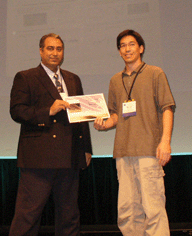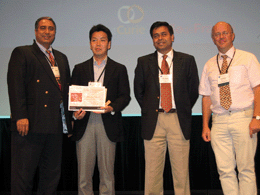A successful 2007, more growth in 2008
As 2008 begins, Lab on a Chip is able to look back and reflect on yet another successful year in which we have provided a great deal of support to the communities associated with the journal in a variety of ways. We have provided financial support to conferences and meetings that have helped to advance the science, we have supported students both financially to attend meetings and with subscriptions to the journal, we have awarded prizes for student posters at several meetings with the most prestigious being the Widmer Prize at the µTAS Conference (won by Kevin Lee of MIT). | ||
| Plate1 From left: Harp Minhas and Kevin Lee | ||
 | ||
| Plate2 From left: Harp Minhas, Manabu Tokeshi, Joydeep Lahiri and Andreas Manz | ||
Our newest web feature to assist the community with the tips and tricks often required to make things work better in the laboratory Chips and Tips continues to grow in popularity and content, the more such “tips” we publish the more useful this feature will be to all concerned. If you have not yet seen this feature or feel you can contribute something that is relevant and useful, please see http://www.rsc.org/Publishing/Journals/lc/Chips_and_Tips/index.asp or contact either David Beebe or Glen Walker—both Editors of the column.
I intend the journal to grow substantially in 2008 and, therefore, encourage you to send in even more of your very best work to Lab on a Chip for publication. Lab on a Chip can offer you: fast publication (averaging four months from receipt); a knowledgeable, friendly and sympathetic team dealing with your enquiries; free colour where it enhances understanding; and one of the highest impact factors in the field. Take another look at the Lab on a Chip scope and see what other subject areas we cover (http://www.rsc.org/Publishing/ReSourCe/AuthorGuidelines/JournalPolicy/LC/sect1.asp).
As you read about the developments listed below, you will also appreciate that the RSC continues its successful march forward—not only as a major not-for-profit publisher of the highest calibre supporting the chemical and related sciences, but also as a pioneer of unique award-winning and innovative tools to assist authors and enhance understanding for our readers.
Finally, I would like to express my sincere thanks to: all our authors who provide the excellent research that is published in the journal; our referees who continue to provide such an excellent service, despite all the new competitors that now publish work dealing with subjects covered by LOC; to the CBMS Board of the µTAS Conference for their co-operation in allowing Lab on a Chip such a close association with the meeting; to Albert van den Berg and Jan Eijkel who have so ably written the LOC Focus Articles over the last two years—they will be succeeded by Sumita Pennathur (see Fig. 1) whose first article appears in this issue; and finally to you all as subscribers and readers of the journal.
 | ||
| Fig. 1 Professor Sumita Pennathur is an Assistant Professor of Mechanical Engineering in UCSB. She completed her BS and MS at MIT, and PhD at Stanford, before pursuing postdoctoral research at Sandia National Laboratories and University of Twente. She has over 10 years experience in the micro- and nano-fluidics field. Her research interests include nanofluidics, electrokinetics, and bioanalytical systems. | ||
Lab on a Chip intends to continue its support of the community in 2008 and I look forward to meeting many of you again in the near future to hear your ideas about how to make Lab on a Chip more relevant to your specific needs and how the journal can be further improved. I wish you all a peaceful and successful new year.
High impact
RSC Publishing is celebrating news of continued success for its journals, following the release of the 2006 impact factors, calculated by ISI®. Journals from across the collection in areas of research such as analytical, materials and green chemistry have recorded significant rises to become leading impact journals in their field, while new interdisciplinary titles have received their first official ranking of the internationally recognised publishing industry metric.Among the headline success stories is Green Chemistry, the only journal publishing a mix of primary and secondary research in the field, which sees its impact factor rise by a staggering 29% to 4.19. The already impressive impact factor for Lab on a Chip has increased by a further 10% to 5.82, ensuring that it remains one of the leading journals in micro- and nano- research.
Award-winning technology and enhanced HTML articles
Launched in February 2007, RSC Project Prospect has had an exceptional first year. Bringing science alive via enhanced HTML articles in RSC journals, the project delivers: hyperlinked compound information (including downloadable structures) in text; links to IUPAC Gold Book terms; ontology terms linked to definitions and related articles; plus RSS feeds that include structured subject and compound information, enabling at-a-glance identification of relevant articles. As the only publisher able to offer these enhancements, we were delighted to be awarded the 2007 ALPSP/Charlesworth Award for Publishing Innovation, where judges described RSC Prospect articles as “delightfully simple to use … benefits to authors and readers are immediately obvious.” Around 1400 articles have now been published with enhanced HTML—to see for yourself, look out for the RSC Prospect icon on our website. Further developments to the project will be announced in 2008. Many of you have already told us how impressed you are with the project—http://www.projectprospect.org has examples of enhanced articles, feedback from the scientific community, plus the latest news.Website changes
Following feedback from journal readers a number of changes have been introduced across all RSC Journals. The Lab on a Chip homepage now contains the contents list for the current issue, delivering the content you want to see as soon as you arrive at the site. Graphical abstracts are included as standard, allowing you to browse content much more conveniently. A more prominent and easy-to-use search box also makes finding published research much more intuitive. Advance Articles will soon also be available in pdf format.For authors, the RSC Journal templates have been revised and updated to assist submission in a format similar to the journal layout. The guidelines for the use of colour in the printed versions of RSC Journals will be relaxed in 2008, and the decision on the free use of colour will be based on whether the use of colour enhances the scientific understanding of the figure (the old policy required the colour to be essential). In addition, for the online version of the journals, colour will be provided at no cost in both the pdf and html versions.
Energy & Environmental Science
RSC Publishing will be launching a new journal in summer 2008. Energy & Environmental Science will cover all aspects of the chemical sciences relating to energy conversion and storage, alternative fuel technologies, and environmental science. Visit the website for the latest news: www.rsc.org/eesMolecular BioSystems spin out
It's official, Molecular BioSystems has separated from host journal, Chemical Communications, and is now a fully fledged solo publication. Its availability since launch to readers of Chemical Communications and the online hosts, Organic & Bimolecular Chemistry, Lab on a Chip, The Analyst and Analytical Abstracts has ensured that Molecular BioSystems received a large and interdisciplinary audience from the outset. Lab on a Chip readers wishing to continue to read Molecular BioSystems now need to recommend the journal to their librarian. Fill in the online recommendation form at www.rsc.org/libraryrecommendation‘Lab on a Chip book of choice' scheme
Launched in Spring 2007, the RSC eBook Collection offers scientists across the globe online access to a prestigious and wide ranging portfolio of chemical science books which span 40 years of research and opinion.The RSC eBook Collection is testament to RSC's publishing innovation as well as the high quality of the content contained in our books. With further technical developments and new 2008 content being uploaded throughout the year the RSC eBook Collection is set to become a key resource. To search the collection or for further information visit www.rsc.org/ebooks
Scientists from all four corners of the globe are taking advantage of the free first chapter downloads and from January 2008, Lab on a Chip will regularly highlight a book specifically for our readers through our ‘Lab on a Chip book of choice’ scheme. More information is available on the Lab on a Chip website.
25% Book discount for RSC authors, editors and referees
If you would like to buy a print copy of the ‘Lab on a Chip book of choice’ or other titles from the RSC, and you are an RSC author, editor or referee you can enjoy a special 25% discount on your book purchase. You can redeem this offer online through the RSC Online Shop. To find out how to claim your exclusive discount, visit www.rsc.org/shopHarp Minhas
Editor
| This journal is © The Royal Society of Chemistry 2008 |
